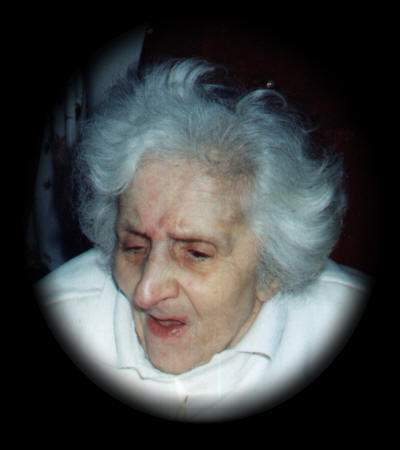
Bentleigh House did not have the "grandeur" of such places as the Dementia Wing at Montefiore Homes, but it was also not as "sterile" and more like a home. The care and attention my mother received from the nurses and staff at Bentleigh House Nursing Home was superb. This became apparent from the outset, as I visited my mother daily, with my wife and children calling by several times a week.
Even at the time of her admission she had completely forgotten who we were. My mother was now well and truly back home with her parents, brothers and sisters in the Lodz Ghetto. Thinking that I was her brother, on each of my visits she would ask me Mameshi and Tateshi were allright, and, not attempting to clarify that I was not her brother, I would reassure her they were - that everything was all right. That reassurance was all she wanted.
On many occasions she would pour out streams of unintelligible Yiddish - details of episodes in her life many decades ago - during the war and before. It was as if her brain was being purged - as if the last vestiges of memories - memories of the minutest incidents in her life - were being dumped from her brain, never to return.
Nevertheless my mother, although confused, was happy and rewarded the attention of the nurses with a beaming smile every time they passed. She greeted my two children, Linda and Eli, with a beaming smile each time she saw them.

She was delighted to see Lin and my children, although I never knew who she thought they were. It did not matter. Although Bentleigh House was not a Jewish nursing home, that in no way affected my mother's psychological welfare. She was already beyond having any reasoned conversation in any language, but the staff never had any trouble understanding what she needed. To be on the safe side I wrote the nurses and staff a list of translations of common Polish expressions and words my mother was likely to say and understand.
Over the years there would be the odd Polish and Jewish nurse and the odd Jewish visitor who would brighten up my mother occasionally with their more familiar language. Uncle Icek and Aunt Ruth called once only soon after my mother was admitted, but found the experience of seeing my mother in such a condition traumatic. I did not want them to visit my mother, since Aunt Ruth had her own medical problems, and Uncle Icek was also not well. They did not need the extra trauma of seeing my mother.
My mother was the "model patient". Having been gentle all her life, she was now gentle in her affliction.
Inevitably and remorselessly the dementia was sapping my mother both mentally and increasingly physically until she was no longer able to walk around or to talk, spending her time in bed and eventually needing to be fed by the nurses or us whenever we called.
I was happy for my mother where she was. She was well looked after and she was not suffering. In fact ever since she developed Alzheimers she was not preoccupied with self-prescribed diets and ate better than ever.
Unfortunately as my mother's the physical state began to break down, there was less happiness. There were no more smiles; no more talking - not even aimless chatter.
Eventually she began to be hit hard by whatever cold and flu was going around the nursing home. A couple of times she got better through the timely administration of antibiotics, but each time she became weaker and less able to fight off the congestion and fever that came with the bugs.
Eventually we did not think she would last the next cold and the next... but she did.
The sickly girl of pre-war had been toughened by the stark years in the concentration camps and would not give in. Just as my Uncle Icek did not give in when, eventually in a Home for the Aged with Aunt Ruth, he succumbed to multiple strokes until he became a vegetable and eventually passed away. I had been calling on the Cytrynowskis at Montefiore frequently and was sad to see them both deteriorate so much.
On several occasions with tears in my eyes I discussed possible funeral arrangements for my mother, expecting her not to survive her current affliction. My mother was no longer happy, sometimes looking at me plaintively, as if saying "please let me die..." She now refused to eat, often holding her mouth tightly closed. On several occasions some of the lovely staff and nurses at Bentleigh House were wiping tears from their eyes with emotion. I was praying that she recover from her latest congestion and pass away gently.
On one instance, having not known who I was for several years, my mother looked at me pointedly and said "Heniek" - my Polish name.
That was not to be. That final time came on the 17th of November 1997. My mother had caught another cold, but in her weak state was unable to cough up the mass of phlegm that was choking her. Nurses and staff were by her side, cuddling her like a baby, with tears running down their faces. We just wanted my mother to be comfortable. My mother's doctor was there. He administered morphine, and my mother seemed more comfortable. I briefly returned home. During that time, close to midnight, my mother passed away - peacefully.
Raizele Mydlarz - survivor of the Holocaust, Raizele Kuszer - "Aidele Raizele" (gentle Raizele), as her family used to call her - was dead.
I despaired at the misfortune that had doomed my mother to die in such misery.